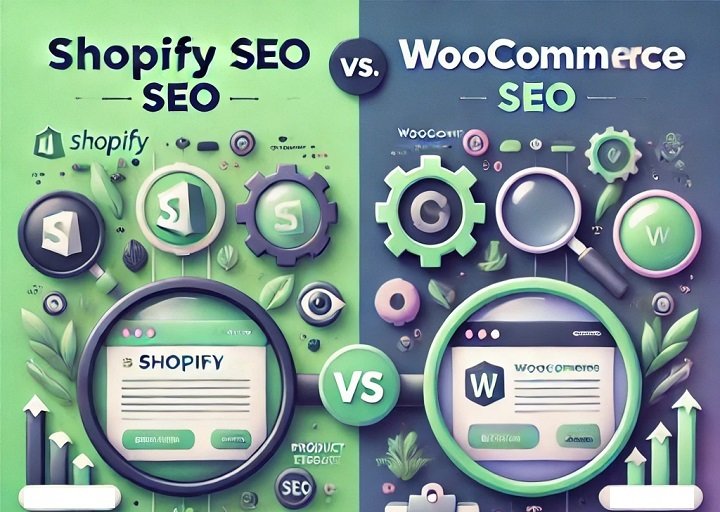In the ever-evolving landscape of e-commerce, choosing the right platform is crucial for your business’s success. Shopify and WooCommerce are two of the most popular e-commerce platforms, each offering distinct advantages and capabilities. One critical factor that can influence your choice is SEO (Search Engine Optimization). In this blog, we’ll delve into the SEO capabilities of Shopify and WooCommerce, comparing their features to help you determine which platform might be better suited for your business needs.
Understanding Shopify and WooCommerce
Before diving into the specifics of SEO, it’s essential to understand what Shopify and WooCommerce are and how they differ:
Shopify: Shopify is a proprietary, hosted e-commerce platform known for its user-friendly interface, scalability, and built-in features. It offers a range of templates and apps designed to streamline the creation and management of online stores. Shopify takes care of hosting, security, and updates, allowing users to focus on running their business.
WooCommerce: WooCommerce, on the other hand, is an open-source WordPress plugin that transforms a WordPress site into a fully functional online store. It provides a high level of customization and flexibility, but requires users to manage hosting, security, and updates themselves.
SEO Capabilities of Shopify
Shopify is renowned for its ease of use and built-in features, which extend to SEO as well. Here’s a breakdown of Shopify’s SEO strengths:
1. Built-In SEO Features
Shopify comes with several built-in SEO features that simplify the optimization process:
- Meta Tags: Shopify allows you to easily edit meta titles and descriptions for products, pages, and collections.
- Sitemap: Automatically generates and updates an XML sitemap, helping search engines crawl and index your site efficiently.
- URL Structure: Shopify’s URL structure is clean and SEO-friendly, though it’s somewhat rigid, with URLs often incorporating the product type and handle.
2. App Integrations
Shopify’s App Store offers a variety of SEO tools that can enhance your store’s performance:
- SEO Manager: An app that helps optimize meta tags, manage redirects, and generate sitemaps.
- Plug in SEO: Offers a comprehensive SEO audit and actionable insights.
3. Mobile Optimization
Shopify themes are designed to be responsive, ensuring that your store looks great and functions well on all devices. This mobile-friendliness is crucial for SEO, as search engines like Google prioritize mobile-first indexing.
4. Performance
Shopify is optimized for speed, which positively impacts SEO. Page load times are a significant factor in search engine rankings, and Shopify’s infrastructure is built to handle high traffic volumes and ensure fast load speeds.
SEO Capabilities of WooCommerce
WooCommerce provides extensive customization options, which also apply to SEO. Here’s what makes WooCommerce a strong contender in the SEO arena:
1. Customization and Flexibility
WooCommerce’s integration with WordPress offers unparalleled flexibility:
- Permalinks: Allows for customizable URL structures, which can be optimized for keywords.
- Meta Tags: Plugins like Yoast SEO or All in One SEO Pack provide extensive meta tag editing capabilities and on-page SEO analysis.
2. Plugins and Extensions
The WordPress ecosystem offers a vast array of SEO plugins that enhance WooCommerce:
- Yoast SEO: A popular plugin that offers on-page SEO optimization, readability analysis, and advanced schema markup options.
- Rank Math: Another powerful SEO plugin that provides detailed insights and optimization features.
3. Content Management
WooCommerce benefits from WordPress’s robust content management capabilities:
- Blogging: Easily add and manage a blog, which can drive traffic and improve SEO through content marketing.
- Customizable Content: WordPress allows for the creation of custom post types and taxonomies, offering additional ways to structure and optimize content.
4. Technical SEO
WooCommerce’s open-source nature allows for more granular control over technical SEO aspects:
- Schema Markup: Plugins and custom code can be used to implement rich snippets and structured data.
- Performance Optimization: You can leverage various caching and optimization plugins to enhance site speed and performance.
Comparing Shopify and WooCommerce for SEO
1. Ease of Use
- Shopify: Simplifies SEO with built-in features and apps, making it suitable for users who prefer an all-in-one solution without much technical involvement.
- WooCommerce: Requires more hands-on management and customization but offers greater flexibility for users who are comfortable with WordPress and want to fine-tune every aspect of their SEO strategy.
2. Customization and Control
- Shopify: Offers limited customization in terms of URL structures and meta tags but is user-friendly and efficient for basic SEO needs.
- WooCommerce: Provides extensive customization options and control over SEO elements, making it ideal for those with advanced SEO requirements.
3. Performance and Speed
- Shopify: Optimized for performance out of the box, with fast load times and reliable hosting.
- WooCommerce: Performance can vary based on the hosting provider and optimization efforts, requiring proactive management to maintain speed.
4. Cost and Scalability
- Shopify: Includes SEO features in its pricing plans but may involve additional costs for advanced apps and features.
- WooCommerce: The base plugin is free, but costs can add up with premium plugins and hosting. It offers scalable solutions based on your needs and budget.
Conclusion
Both Shopify and WooCommerce offer robust SEO capabilities, but the choice between them ultimately depends on your business’s needs, technical expertise, and long-term goals. Shopify is an excellent choice for those seeking an easy-to-use, all-in-one solution with built-in SEO features. In contrast, WooCommerce is ideal for users who require greater customization, flexibility, and control over their SEO strategy.
By evaluating your business requirements and considering factors like ease of use, customization, performance, and cost, you can make an informed decision about which platform will better serve your SEO needs and contribute to your online success.

